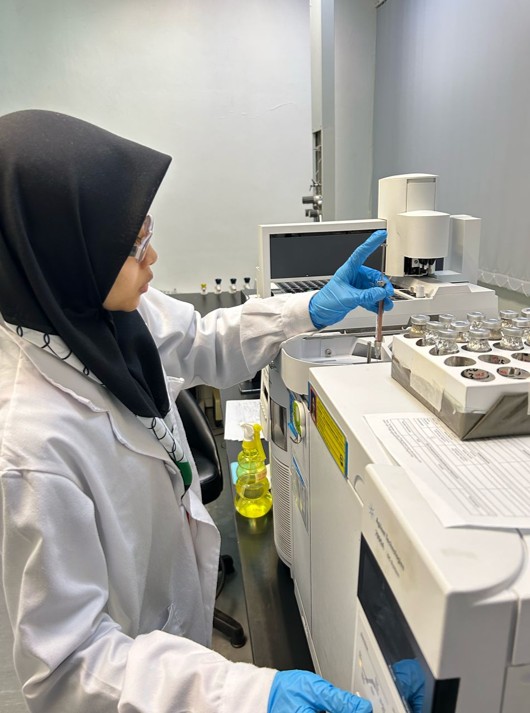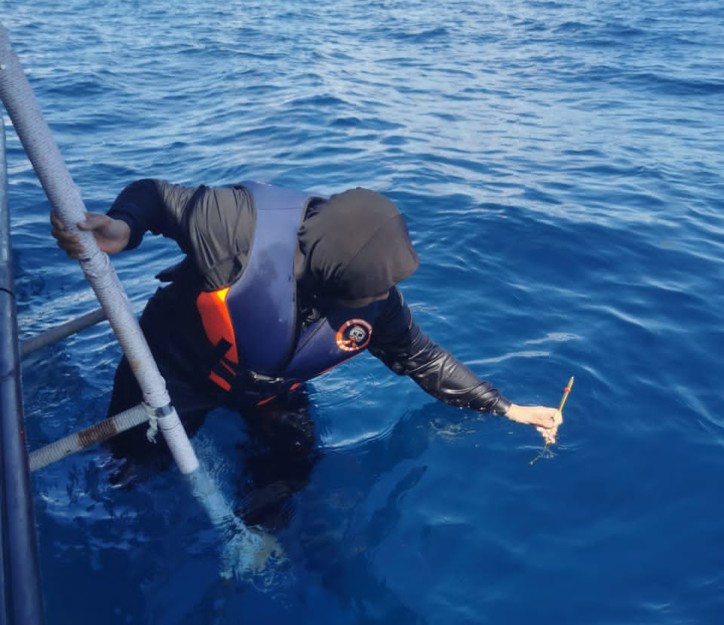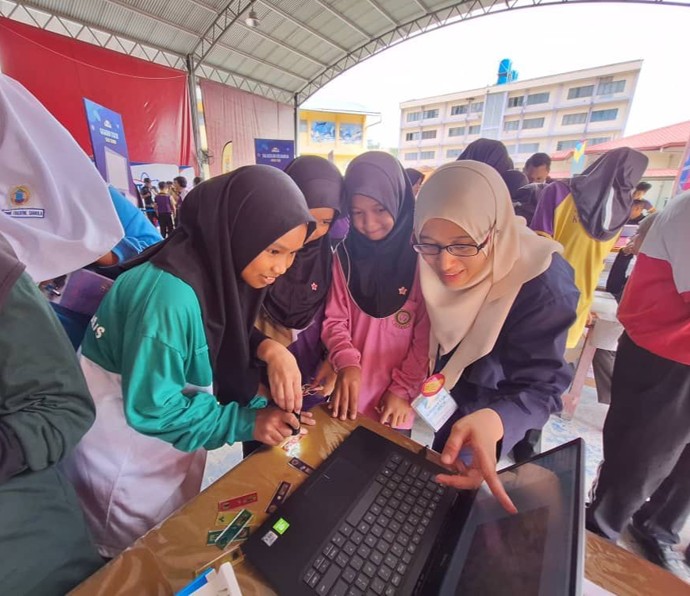Article by:
Assoc. Prof. Dr. Zarina Amin Prof. Dr. Vijay Kumar
Biotechnology Research Institute,
Universiti Malaysia Sabah
This email address is being protected from spambots. You need JavaScript enabled to view it.
 Sabah, located on the island of Borneo, is one of the most biodiverse regions in Southeast Asia, home to extraordinary ecosystems and unique genetic resources with immense scientific and biotechnological potential. Renowned as a global biodiversity hotspot, its rainforests, coral reefs and highland ecosystems shelter countless rare and endemic species.
Sabah, located on the island of Borneo, is one of the most biodiverse regions in Southeast Asia, home to extraordinary ecosystems and unique genetic resources with immense scientific and biotechnological potential. Renowned as a global biodiversity hotspot, its rainforests, coral reefs and highland ecosystems shelter countless rare and endemic species.
Yet, Sabah's future may depend on more than just conserving its lush forests and rich marine environments; it lies in how the state studies, sustains and innovates from these natural assets.
Today, Sabah stands at a pivotal crossroads: to embrace biotechnology as a key pillar of sustainable development, or risk leaving its remarkable natural wealth underexplored and underutilized.
In a bold move toward economic diversification and sustainable development, the Sabah state government, through the Sabah Biodiversity Centre (SaBC), a department under the Chief Minister's Department launched the Sabah Biotechnology Action Blueprint 2024-2034 in June 2024.
This decade-long strategic plan positions Sabah as a future leader in the regional bioeconomy. The blueprint aims to harness biotechnology to address the state's unique environmental and socio-economic challenges.
With its exceptional biodiversity and abundant natural resources, Sabah is ideally placed to advance agricultural, marine and environmental biotechnology.
By fostering innovation in these key sectors, the blueprint seeks to develop high-value industries that improve local livelihoods, create skilled jobs and enhance Sabah's global competitiveness.
The blueprint aligns with global trends of leveraging science and innovation for sustainable growth, opening new avenues for job creation, investment and technological progress. It identifies five focus areas: industrial, healthcare, forestry, biotourism and agriculture; supported by five strategic thrusts to promote scientific advancement, economic diversification, community engagement and environmental sustainability.
Experts have cautioned that without targeted research investment, Sabah's biological wealth risks remaining untapped and vulnerable. In response, the blueprint prioritizes converting research into sustainable revenue streams, focusing on promising sectors such as functional foods, precision agriculture, sustainable aquaculture and natural product development. Aligned with the National Biotechnology Policy 2.0 (DBN 2.0) launched in September 2022, the blueprint leverages Sabah's vast biodiversity, indigenous knowledge and growing research capabilities.
As environmental concerns grow and the global focus shifts toward sustainability, the role of higher education institutions has never been more vital. At the core of this scientific push is Universiti Malaysia Sabah (UMS), widely regarded as a central force in driving biotechnology research, biodiversity conservation and inclusive innovation.
Through a range of strategic grants, collaborative projects and strong institutional leadership, UMS is translating scientific discovery into real-world impact; anchoring Sabah's transition to a resilient, knowledge-driven bioeconomy.
 UMS's biotechnology leadership is rooted in its Centres of Excellence (COE): the Biotechnology Research Institute (BRI), Borneo Marine Research Institute (BMRI), and the Institute for Tropical Biology and Conservation (ITBC). These centres are pioneering efforts across terrestrial, microbial and marine biotechnology.
UMS's biotechnology leadership is rooted in its Centres of Excellence (COE): the Biotechnology Research Institute (BRI), Borneo Marine Research Institute (BMRI), and the Institute for Tropical Biology and Conservation (ITBC). These centres are pioneering efforts across terrestrial, microbial and marine biotechnology.
Their shared mission is to unlock the value of Sabah's extraordinary bio-resources for both industry development and environmental stewardship. UMS's work in microbial and plant biotechnology contributes to the development of high value bioproducts, while research on the genetic diversity and bioactivity of plant and marine species underpins conservation, agriculture and climate resilience efforts.
A testament to UMS's strength is its success in securing major research funding.
Between 2023 and 2024, UMS was awarded a total of RM18 million in external grants, including RM6.25 million under the Ministry of Higher Education's Translational Sustainability Programme. This grant supports targeted research in energy, agriculture, and environmental biotechnology, with a strong emphasis on local relevance and real-world application.
UMS’s involvement in the Petronas–Academia Collaboration Dialogue (PACD) further advances Sabah’s clean energy goals. In early 2024, UMS received RM5.75 million to support bioenergy research, particularly in microbial hydrogen production and biomass conversion. This initiative highlights the potential of Sabah's microbial resources in driving low-carbon, sustainable industrial development.
To support these efforts, UMS continues to upgrade its infrastructure. The Biotechnology Research Institute now houses a state-of-the-art High-End equipment facility, featuring Transmission and Scanning Electron Microscopes, a Nuclear Magnetic Resonance (NMR) hyphenated system and a two-storey Class 3 Biosafety Laboratory for animal and human work as well as a dedicated Class 3 Transgenic Biosafety Laboratory for genetic modification research.
These tools and facilities are crucial for advanced innovations in molecular biology, natural product discovery and the characterization of bioactive compounds sourced from Sabah's rich ecosystems.
UMS's research programmes align closely with state and national development strategies such as the Sabah Maju Jaya roadmap and DBN 2.0. Through the SBAB, UMS is helping transform Sabah's biodiversity into a sustainable economic pillar while promoting ethical, community- focused research.
Collaboration is fundamental to UMS's approach. The university works closely with various government agencies, international institutions and local communities.
Leading BRI researchers such as Prof. Dr. Michael Wong, Prof. Dr. Vijay Kumar, Assoc. Prof. Dr. Mailin Misson and Dr. Nur Athirah Yusuf have advanced biotechnology for community wellbeing and regional growth. BRI's landmark contributions include decoding the MD2 pineapple genome, as well as genetic studies of endangered species such as the Sunda stink-badger, horseshoe crabs, staghorn corals, slipper orchids, proboscis monkeys and the indigenous peoples of Sabah.
In a landmark collaborative effort between SaBC and BRI in 2020, more than 1,000 bacterial strains were successfully isolated from marine and terrestrial conservation sites across Sabah.
Among these, over 70 species demonstrated significant industrial and medical potential, including the ability to produce valuable enzymes such as amylases and proteases, as well as antimicrobial compounds.
This initiative has strengthened UMS’s position not only as a leader in tropical genomics and conservation biotechnology, but also as a key contributor to industrial and healthcare biotechnology, which are core pillars of the state’s biotechnology blueprint.
 Equally important is UMS's role in public education and awareness. Through the efforts of Yayasan Penyelidikan Antartika Sultan Mizan (YPASM) and Akademi Sains Malaysia (ASM) Fellows, UMS has delivered impactful outreach programmes to schoolchildren and rural communities.
Equally important is UMS's role in public education and awareness. Through the efforts of Yayasan Penyelidikan Antartika Sultan Mizan (YPASM) and Akademi Sains Malaysia (ASM) Fellows, UMS has delivered impactful outreach programmes to schoolchildren and rural communities.
These initiatives bring biotechnology education into classrooms and community halls, covering molecular biology, microbial diversity and environmental DNA.
“Sabah's biodiversity is a gateway to biotechnology,” said Dr. Nur Athirah Yusuf. “From tropical forests to polar regions, our research helps link local knowledge with global solutions and proves that science truly knows no boundaries.”
These workshops, demonstrations and science-based storytelling sessions are inspiring a new generation of Sabahans to see biotechnology as both accessible and meaningful, while fostering early interest in STEM and conservation careers.
Sustainability remains at the core of UMS's mission. The SBAB explicitly rejects extractive, externally driven models that have failed other biodiverse regions.
“Sabah has the potential to become a global model for biodiversity-driven innovation,” said Prof. Dr. Clemente Wong, a molecular microbiologist and research pioneer. “But success depends on sustained investment, not just in infrastructure, but in the people who make it happen.”
In conclusion, Universiti Malaysia Sabah exemplifies how a university can serve as both a steward of biodiversity and a driver of bioeconomic transformation. Through its multidisciplinary research, strategic partnerships and grassroots engagement, UMS is building a future where science, society and sustainability converge.
Its work ensures that Sabah's natural heritage becomes a foundation for lasting innovation, opportunity and prosperity for generations to come.


